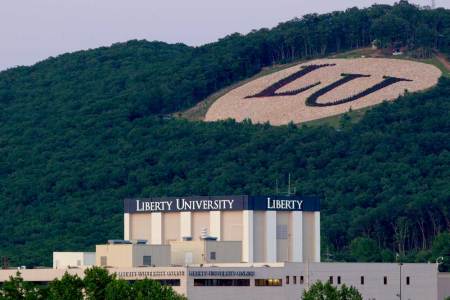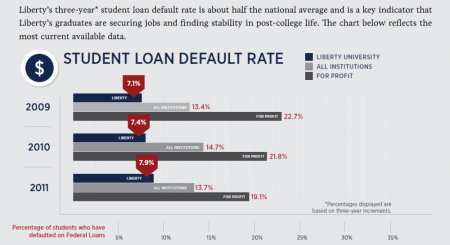Liberty University Among Top 20 Schools Accounting for a Fifth of All Graduate School Debt; $351 Million Borrowed in One Year

Graduate students at Liberty University in Lynchburg, Virginia, America's largest private, nonprofit university and the world's largest Christian university, borrowed more than $351 million to fund their studies in the 2013-2014 academic year to place the institution on a list of 20 schools responsible for a fifth of all graduate school debt.
A new study from the Center for American Progress highlighted by The Washington Post, showed that Liberty University was ranked seventh on the list of 20 schools to which the government disbursed $6.5 billion in loans on behalf of graduate students even though these schools only educate 12 percent of the nation's graduate students.
Liberty University was ranked behind Walden University where students borrowed the most at just over $756 million and Nova Southeastern University where graduate students borrowed more than half a billion dollars.
The report, however, appears to criticize Liberty University's presence on the list primarily because 98 percent of the school's graduate students are enrolled in online programs often marketed as time and cost effective.
In a statement to The Christian Post on Monday, Liberty University explained that simply highlighting the school's borrowing numbers does not "present a full picture."
"A better method should include the school's price, the average borrowing per student, and the school's federal default rate," the school noted.

"Price is important for two reasons. First, a lower initial price reduces pressure on students to borrow. Second, even if the student does borrow a large amount at a lower-priced school, funds beyond the school's price are passed on to the student in a refund. The student then chooses to use those funds for their own personal expenses (perhaps to pay for rent off campus, or food, etc.). Liberty's online programs are competitively priced and our resident full cost of education remains in the bottom 25 percent of all private schools nationwide," it noted.
"Additionally, average borrowing data from the National Center for Educational Statistics appear to show that the national average graduate student borrowing for '13-'14 was $18,312 for graduate unsubsidized loans and $22,868 for Graduate PLUS Loans. Liberty's average is lower in both cases at only $13,395 and $10,148 respectively," the statement continued.
"Considering the default rate is also important for this type of article. The default rate, in part, indicates if the students are employed and paying back their loans. This is important to the U.S. Department of Education, which runs the Federal Direct Loan program, because it is a large source of revenue for them. Liberty University students default at a rate of 7.9 percent. This is lower than the national average (13.7 percent), the public school average (12.9 percent), the proprietary school average (19.1 percent) and also the Virginia school average (10 percent)," the statement ended.





















